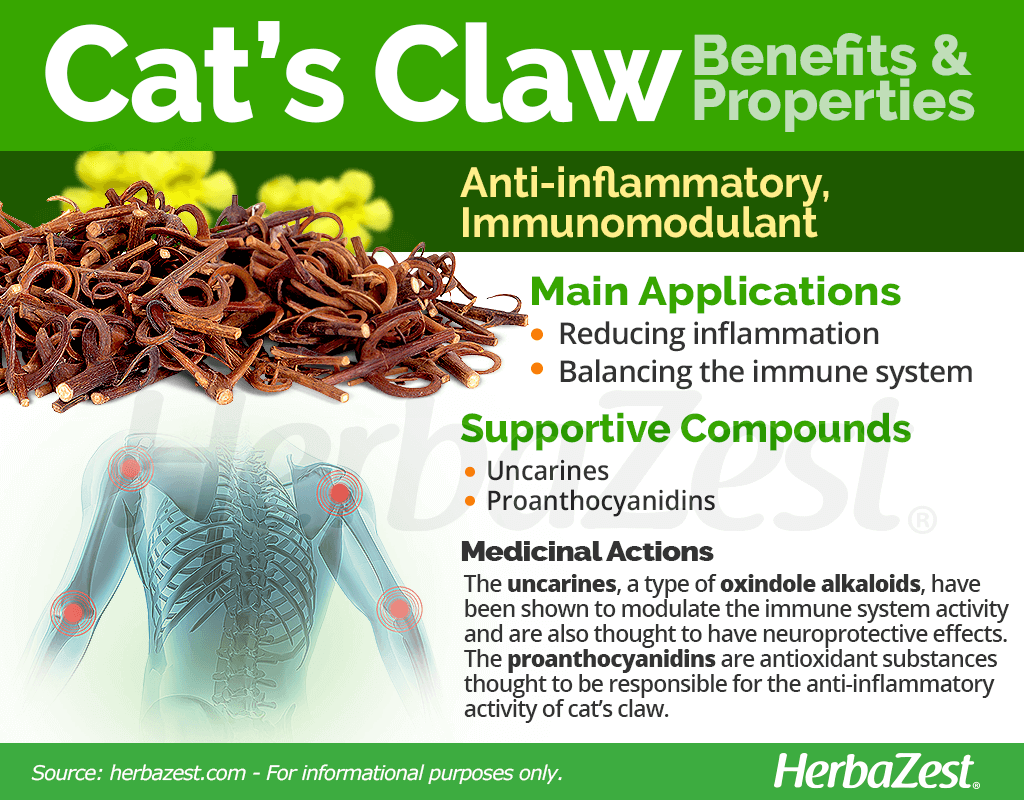
The problem is there is no real agreement. A small study in 27 men found that consuming 700 mg.

At higher doses it may be toxic.
Cats claw autoimmune disease. You should be okay taking Cats Claw. It is also an immune modulator meaning that it works both ways in regulating the immune system. It helps decrease inflammation and inflammation is what eventually causes autoimmunity.
This would be needed to be explained in much more detail but for now the answer is you can try it in low doses and work your way up. If you notice any symptoms that seem. The Buhner Healing Lyme site on Facebook has discussed the autoimmune issue with cats claw many times if you search that group.
The problem is there is no real agreement. Some people have autoimmune disease and take cats claw with no problems and others cant take it. Cats Claw might over stimulate the nervous system instead of modulate it in those with autoimmune disease from what I.
Cats claw might make the immune system more active which could increase symptoms of autoimmune diseases. If you have an autoimmune disease consult your health care provider before using cats claw. Little is known about whether its safe to use cats claw during pregnancy or while breastfeeding.
Cats claw may interact with some medications including some HIV drugs called protease inhibitors. People with autoimmune diseases skin grafts tuberculosis or those receiving organ transplants should not use cats claw unless specifically directed by their physician because of its possible effects on the immune system. People with leukemia or low blood pressure should not take cats claw.
Discoid lupus erythematosus DLE is another autoimmune skin disease rarely seen in cats. The common clinical signs of DLE include loss of pigmentation around the cats lips and the skin around the eyes. The ears and the genitals may also be affected.
DLE can transform the surface of the nose from its normal cobblestone texture to smooth and flat. Ulcerated sores may occur. Some cats find the disease.
Claw diseases in dogs and cats are often diagnostic and therapeutic challenges. A detailed case history a thorough physical examination and appropriate complementary examinations are required to establish a diagnosis. The latter include cytology bacteriology mycology histopathology skin biopsy around the nail bed or even third phalanx amputation sometimes very helpful and immunological tests such as skin.
When a cats claw develops a bacterial infection its often a result of an underlying condition such as allergies or autoimmune disorders. The vet will determine if theres a root cause to be treated as well as prescribe antibiotics. Loose or fractured nails will be removed and occasionally a foot scrub or soak helps.
SLE is a somewhat rare autoimmune disease in cats but it can still affect some animals. In this case the pets immune system attacks itself and affects a variety of tissues and organs from the skin and joints to the heart kidneys and even the cats lungs. Cats that have SLE can experience different forms of it.
There are at least 6 types but also a general one that affects several organs at the same time. Cats that are allowed to roam outdoors male cats and older cats are more likely to become infected. This viral infection attacks the immune system leading to infections of the gums mouth digestive tract urinary tract and skin.
Low red and white blood cell counts certain cancers or neurologic disease may also be seen. Shortly after becoming infected cats may have a fever and. Cats claw is generally well tolerated and considered non-toxic.
According to reports its only potential side effect is diarrhea. However since cats claw may stimulate the immune system it should be avoided by those undergoing organ transplants skin grafts and immunosuppressive therapy. While evidence suggests that cats claw may benefit rheumatoid arthritis sufferers it should not be used on a long.
Some small preliminary studies from 2001 and 2002 suggest that cats claw may reduce pain in people with rheumatoid arthritis RA 3 an autoimmune disease and osteoarthritis 4 wear-and-tear arthritis. Cats Claw also known as Uncaria tomentosa is rapidly becoming a popular nootropic aiding in reducing brain fog memory loss depression neurodegenerative disorders and diseases. Researchsuggests cats claw targets rheumatoid arthritis inflammation thereby easing the symptoms.
Cats claw is a popular herbal supplement derived from a. Cats claw may support your immune system possibly helping fight infections more effectively. A small study in 27 men found that consuming 700 mg.
Studies show that cats claw isnt toxic at standard dosing levels. At higher doses it may be toxic. Women who are pregnant or breastfeeding should not use cats claw.
Cats claw may interact with some HIV and AIDS medicines. Because cats claw may stimulate the immune system people with certain autoimmune conditions shouldnt use it. Cat-scratch Disease Bartonella henselae Cat-scratch disease is a bacterial disease that people may get after being bitten or scratched by a cat.
About 40 of cats carry the bacteria at some time in their lives although kittens younger than 1 year of age are more likely to have it. Most cats with this infection show no signs of illness. The recommended dose is 250 to 350 mg per day.
While cats claw usually has little to no side effects you shouldnt take it if you have an autoimmune disease leukemia low blood pressure or. Acute renal failure caused by cats claw herbal remedy in a patient with systemic lupus erythematosus Nephron. Authors J N Hilepo A G Bellucci R T Mossey.
101159000190304 No abstract available.